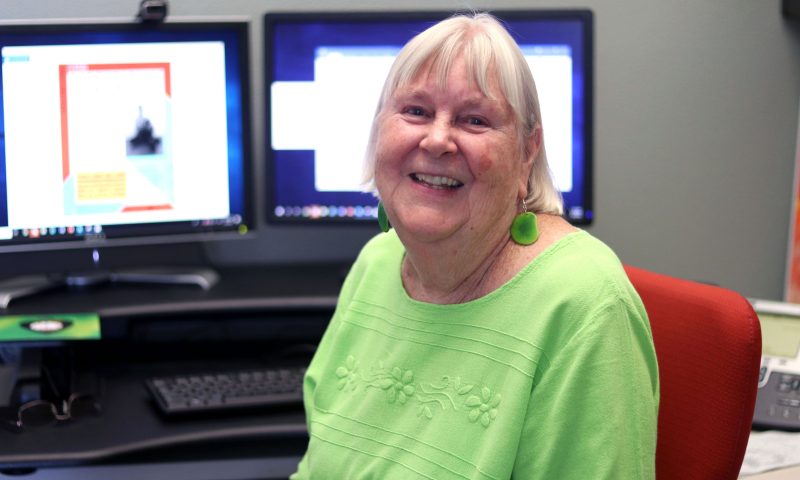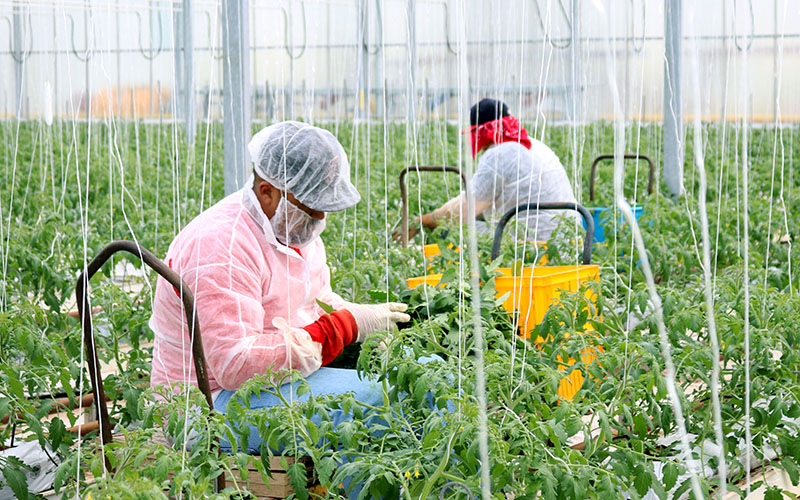
Jill Guernsey de Zapien, University of Arizona public health professor, says long hours at the farms also makes health care less accessible to laborers. (Photo by Megan Marples/Cronkite News)
PHOENIX – For more than three decades, Jill Guernsey de Zapien has fought to improve public health in underserved communities across the Southwest. She helped start a program in southeastern Arizona to bring better care to rural residents, and farmworkers in particular.
She was inspired by her father, a labor organizer.
Guernsey de Zapien, director of border, transborder and binational public health collaborative research at the University of Arizona, spent time with Cronkite News to discuss her efforts and a program in the colonia of Winchester Heights, north of Willcox, to bring more health care to more people.
What is the Arizona Area Health Education Centers Program (AHEC)?
AHEC has five centers and it has a centralized office here at the University of Arizona. The five centers cover the entire state. … There’s one in Nogales … Yuma … Flagstaff … Globe, and there’s one in Maricopa County. Its purpose is to deal with the maldistribution of health professionals. It’s not saying necessarily that we don’t have enough health professionals, it’s saying that they’re not distributed well.
How does AHEC work?
Each one of those centers works in the elementary schools, high schools, etc. to get kids interested in health professions. … The second prong is here at the university, where we … work with the centers to identify students to go out and do rotations in those areas. … And then the third piece is really (to address) why many health professionals, once they’re in an underserved area, why they leave – because they don’t have access to a community of continuing education. So the role of those centers is really to provide that continuing education and connection for health care professionals once they’re in there.
Why are you passionate about farmworkers’ health care?
My father was a labor organizer. As a child, I was very impacted by the film “Harvest of Shame,” by Edward Murrow. … I learned as a child what was going on in terms of the invisibility of farmworkers. Even as a child, it’s so easy to make the connection and go, `Well, wait a minute. Why don’t we support farmworkers? Why don’t they get a decent wage? Why don’t they have good housing? Because everything I’m eating, I couldn’t make it without them being here.
I had a real sense of the injustice of it. As citizens and people who care about social justice, we cannot be spending the rest of our time on this planet allowing the very people who produce the food and harvest the food that we’re eating not to be recognized and have decent wages, decent living conditions, and all the things that everybody else has the right to.
What are common health issues for farmworkers?
Muscular and skeletal kinds of things are very, very common. Arizona was famous because we were the last state to make it illegal to use a short-handled hoe. It’s a hoe that’s half the size of a regular hoe. Workers could work faster in the lettuce, getting rid of the weeds and everything, if they were bent down all the time. So for years and years, there was a doctor named Dr. Augusto Ortiz, who was a champion for farmworkers in this state and worked really closely with Cesar Chavez. It was Dr. Ortiz that finally got the short-handled hoe made illegal. That helped some, but farmworkers are bending all the time. … So that’s one issue.
Pesticide exposure continues to remain a real enigma of, what is the long-term chronic exposure to pesticides? But even in clinics and federally qualified community health centers that are serving farmworkers, physicians are not trained to look for that kind of either acute or chronic exposure, and they don’t have the right questions to ask to figure out some of the things that are going on with the workers.
How has the current political climate around immigration affected farmworkers’ access to health care?
Probably over half of the farmworker population in the country is here in an undocumented status. … You will notice if you go to Cochise County, look at where the checkpoints are with the Border Patrol. They consistently are near where federally qualified community health centers are. Clearly, even people that are totally documented and have some member of their family undocumented within six degrees of separation, it makes them really nervous to have to go through those kind of checkpoints, and they will choose not to do it.
What have you learned from advocating for underserved communities?
I taught our public health advocacy course here at the college. And in the first class, I said, ‘All of you who think that change happens fast, you can go to the door because advocacy is not for the faint of heart.’ You have to be in this for the long haul. Nothing that’s really important is going to change in a day. And if you’re only going to be around to work on something for a week, unless you’re connected to somebody who’s going to be there for 10 years working together with you, you’re not really welcome because it’s not helpful. I think what you see in Winchester Heights is that long haul. You see incredible, incredible results.



